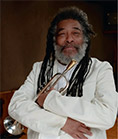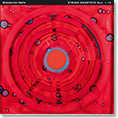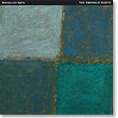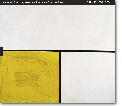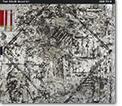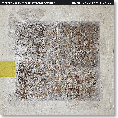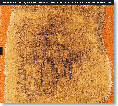THE MUSICIANS
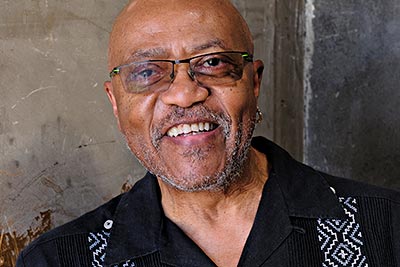
Oliver Lake (b.1942) was born in Marianna, Arkansas, but grew up in St. Louis, Missouri. He began drawing at the age of 13 and soon also started playing the drums but only started playing the saxophone in high school at the age of 18. In St. Louis, Lake first worked in R&B and soul bands with the likes of trumpeter Lester Bowie, then formed, in 1967, his first group as a leader, the Oliver Lake Art Quartet (with trumpeter Floyd LeFlore, bassist Arzinia Richardson and drummer Jerome Harris). After receiving a degree in music education from Lincoln University in 1968, Lake taught music in St. Louis schools for three years. He studied arrangement and composition with Oliver Nelson and Ron Carter and considers Jackie McLean, Eric Dolphy and Duke Ellington as his main influences in music.
Lake was a founding member of the Black Artists Group (BAG) in St. Louis, with other members including saxophonists Hamiet Bluiett, Julius Hemphill and J.D. Parran, trumpeters Baikida Carroll and Floyd LeFlore, trombonist Joseph Bowie, drummer Charles "Bobo" Shaw and many other musicians, dancers, directors, visual artists, writers, et.al. His first recorded work comes from concerts organized by BAG members (Solidarity Unit, Inc.´s Red, Black And Green in 1970 and Children Of The Sun´s Ofamfa in 1971). Lake´s first album as a leader also featured a number of key members of BAG (NTU: Point From Which Creation Begins, with Carroll, LeFlore, Bowie, pianists John Hicks and Clovis Bordeaux, guitarist Richard Martin, bassist Don Officer, percussionist Famoudou Don Moye and Shaw, in 1971). During this period, Lake also recorded with the Human Arts Ensemble, a cooperative group that grew out of BAG (Whisper Of Dharma in 1972 and Under The Sun in 1973).
In 1972, Lake moved to Paris with a number of other BAG members, who recorded a quintet album as Black Artists Group (In Paris, Aries 1973, with Lake, Carroll, LeFlore, Bowie and Shaw). He also played with Anthony Braxton, Wadada Leo Smith and other members of the Creative Construction Company, who were then based in Paris, and recorded a solo saxophone album (Passin´ Thru, with synthesizer player Ivan Pequone added on one track, in 1974). This solo saxophone album became the first release of his own record label, Passin´ Thru, which has released a number of Lake´s recordings since that time and still continues to operate today. Lake also recorded an album with Baikida Carroll in Paris (Orange Fish Tears in 1974).
In September 1974, Lake relocated to New York where he became active on the "loft jazz" scene and soon recorded his first album as a leader for a major label, Arista (Heavy Spirits, with trumpeter Olu Dara, pianist Donald Smith, bassist Stafford James and drummer Victor Lewis as well as three compositions with strings, one with solo saxophone and one with Bowie and Shaw, in 1975). In 1976, Arista also released NTU: Point From Which Creation Begins, which had gone unreleased due to its original label going out of business.
Lake continued his relationship with Wadada Leo Smith after both had returned to the United States, participating in some of Smith´s early recordings (Song Of Humanity in 1976 and The Sky Cries The Blues in 1981). Lake also featured in his own groups many of the same musicians with whom Smith was working after settling in New Haven, Connecticut, including pianist Anthony Davis, guitarist Michael Gregory Jackson and drummer Pheeroan akLaff. In 1976, Lake participated in the legendary Wildflowers - The New York Loft Jazz Sessions in Sam Rivers´ Studio Rivbea both as a leader ("Zaki" on Wildflowers 4, with Jackson, bassist Fred Hopkins and drummer Phillip Wilson) and with Wadada Leo Smith´s New Dalta Akhri ("Logomotif No. 6" on Wildflowers 2, with Smith, Davis, bassist Wes Brown, akLaff and drummer Stanley Crouch) and the Michael Gregory Jackson Quartet ("Clarity" on Wildflowers 3, with the same personnel as on Wildflowers 4). During this same period, Lake also recorded with Anthony Braxton (New York, Fall 1974), trumpeter Ted Daniel (In The Beginning and Interconnection in 1975), guitarists Michael Gregory Jackson (Clarity in 1976) and James "Blood" Ulmer (Are You Glad To Be In America? in 1980 and Freelancing in 1981) and drummers Pheeroan akLaff (Global Mantras in 1977), Sunny Murray (Apple Cores in 1977) and Billy Hart (Enhance in 1977).
Heavy Spirits began a series of small group recordings by Lake initially featuring Anthony Davis, Michael Gregory Jackson, Fred Hopkins and Pheeroan akLaff (Holding Together in 1976, Life Dance Of Is and Shine! in 1978, and Zaki in 1979), and later also the likes of Baikida Carroll, pianists Donald Smith, Geri Allen and John Hicks, guitarists Kevin Eubanks and Anthony Michael Peterson, bassist Santi DeBriano, drummer Gene Lake and steel pan player Lyndon Achee (Prophet in 1980, Clevont Fitzhubert in 1981, Expandable Language in 1984, Gallery in 1986, Impala in 1987, Again And Again and Virtual Reality in 1991, Edge-ing in 1993, Dedicated To Dolphy in 1994, Talkin´ Stick in 1997, Kinda´ Up in 1999, Live in 2001, Have Yourself A Merry… in 2002 and Dat Love in 2003).
Lake has featured strings on his recordings beginning with Heavy Spirits in 1974 and again on a recording by the Oliver Lake String Project (Movement, Turns & Switches) in 1996. The latest example is his collaboration with the FLUX Quartet (Right Up On in 2016).
Lake recorded his second solo saxophone album (Matador Of 1st & 1st) in 1995 and has recorded a number of duo albums (In Concert, with Joseph Bowie, in 1976; Karmonic Suite, with Michael Gregory Jackson, in 1978; For The People, with drummer Jerome Cooper, in 1979; Boston Duets, with pianist Donal Leonellis Fox, in 1989; A New Organization, with pianist Borah Bergman, in 1999; and To Roy, with bassist William Parker, in 2014).
In 1974, Lake participated in the recording of Anthony Braxton´s "Composition 37" for a saxophone quartet with Braxton, Julius Hemphill and Hamiet Bluiett (New York, Fall 1974) and, in 1976, Lake, Hemphill and Bluiett then established a new saxophone quartet with David Murray as its fourth member. Initially, saxophonist Edward "Kidd" Jordan, who served as the head of the music department at the New Orleans Southern University, had just invited the four musicians to perform together in New Orleans but, following that performance, they decided to continue working together and the resulting group, the World Saxophone Quartet, recorded its first album live at the 6th International New Jazz Festival in Moers in 1977 (Point Of No Return).
Following its initial release, the World Saxophone Quartet quickly became one of the most highly acclaimed groups in modern creative music and held that position for more three decades. From 1977 until 2006, the group recorded a total of 20 albums (Steppin´ in 1978, W.S.Q. and Revue in 1980, Live In Zürich in 1981, Live at BAM in 1985, Plays Duke Ellington in 1986, Dances And Ballads in 1987, Rhythm And Blues in 1988, Metamorphosis in 1990, Breath Of Life in 1992, Moving Right Along in 1993, Four Now in 1995, Takin´ It 2 The Next Level in 1996, Selim Sivad - A Tribute To Miles Davis in 1998, Steppenwolf and Requiem For Julius in 1999, 25TH Anniversary in 2000, Quartet Experience in 2003 and Political Blues in 2006) although one of the original members, Julius Hemphill, who had departed from the group around 1990 and passed away in 1995, was in later years replaced by various other saxophonists, including Arthur Blythe, James Spaulding, Eric Person, John Purcell and Bruce Williams, and the group also began featuring various guest artists beginning with Metamorphosis in 1990.
In the 1980s, Lake occasionally played with bassist Reggie Workman in the latter´s ensemble (Synthesis in 1986), as a guest of the cooperative group Trio Transition (with Workman, pianist Mulgrew Miller and drummer Frederick Waits, Trio Transition With Special Guest Oliver Lake in 1988) and with pianist Marilyn Crispell (with Crispell, Lake, Workman, saxophonist Peter Buettner and drummer Gerry Hemingway, Circles in 1990), among others. He also played and recorded with drummer Andrew Cyrille (My Friend Louis in 1991 and Ode To The Living Tree in 1994). In 1992, Lake, Workman and Cyrille then founded Trio 3, a cooperative group that has over time become one of the main performing vehicles for all three of its members, recording more than 10 albums with several of the later ones also featuring a visiting pianist (Live In Willisau in 1997; Encounter in 1999; Open Ideas in 2001; Time Being in 2005; Live At The Sunset in 2007; Berne Concert, with Irene Schweizer, in 2007; At This Time, with Geri Allen, in 2008; Celebrating Mary Lou Williams, with Allen, in 2010; Refraction - Breakin´ Glass, with Jason Moran, in 2012; Wiring, with Vijay Iyer, in 2013; and Visiting Texture in 2016).
In addition to his other small groups, the WSQ and Trio 3, Lake has in recent years performed with the Oliver Lake Organ Trio (Makin´ It, with organist Jared Gold and drummer Johnathan Blake, in 2006) and Oliver Lake Organ Quartet (Plan, with trumpeter Freddie Hendrix, Gold and Blake, in 2009 and What I Heard, with Hendrix, Gold and drummer Chris Beck, in 2013), drawing on the rich tradition of a saxophonist featured with Hammond B3 organ and drums (with or without another horn player added).
Lake has also continued to record with a wide range of other jazz musicians, including saxophonist Bennie Wallace (The Art Of The Saxophone in 1987), guitarist A. Spencer Barefield (After The End in 1987 and Live At Leverkusener Jazztage in 1989), vocalist Abbey Lincoln (Who Used To Dance in 1996), Donal Fox (Gone City in 1997), trumpeter Malachi Thompson (Freebop Now in 1998 and Talking Horns in 1999), drummer C. Anthony Bush (Our Praise Offering in 2000), vocalist David Gonzales (City Of Dreams in 2002), trumpeter Russell Gunn (Ethnomusicology Volume 3 in 2003), trombonist Graig Harris (Souls Within The Veil in 2003), trumpeter Dennis Gonzales (Idle Wild in 2004), the String Trio Of New York (with violinist Rob Thomas, guitarist James Emery and bassist John Lindberg, Frozen Ropes On Barking Hoop in 2004), bassist Lisle Ellis (Sucker Punch Requiem in 2005), saxophonist Archie Shepp (Phat Jam In Milano in 2007), Tarbaby (with pianist Orrin Evans, bassist Eric Reeves and drummer Nasheet Waits and various other guests, The End Of Fear in 2010, Fanon in 2011 and Ballad Of Sam Langford in 2013), percussionist Alex Cline (For People In Sorrow in 2011), the Generations Quartet (Flow in 2016), trumpeter Dave Douglas (Metamorphosis in 2016) and trombonist Samuel Blaser (Early In The Morning in 2017). His most recent collaborative projects have included a quartet with saxophonist John Tchicai, bassist Jonas Westergaard and drummer Kresten Osgood (Lake/Tchicai/Osgood/Westergaard in 2003), a trio with bassist Christian Weber and drummer Dieter Ulrich (For A Little Dancin´ in 2009), a quartet with Weber, Ulrich and trombonist Nils Worgram (All Decks in 2011) and the OGJB Quartet (Bamako, TUM CD 050, in 2016).
Over the years, Lake has also performed with a number of big bands, including the Woodstock Workshop Orchestra led by Karl Berger (Live At Donaueschingen and New Moon in 1979), the Creative Improvisors Orchestra led by Wadada Leo Smith (The Sky Cries The Blues in 1981), the Berlin Jazz Focus Orchestra led by Eric Ross (Music For Theremin and Theremin Summit - Live At Berlin Jazzfest in 2004 and Boulevard D´Reconstructie in 2008), the Mark Masters Ensemble (Farewell Walter Dewey Redman in 2006, Everything You Did: The Music Of Walter Becker & Donald Ragen in 2012 and Our Metier in 2017) and Michele Rosewoman´s New Yor-Uba (A Musical Celebration Of Cuba In America in 2013). Having recorded an album featuring his quintet with a big band already in 1988 (Otherside), Lake has, since 2003, again led his own big band that has featured some of the finest musicians based in the New York Metropolitan area (Cloth in 2003 and Wheels in 2013).
Lake is known as a broadminded musician who is comfortable moving across musical genres. In the early 1980s, he led the reggae-influenced Jump Up, a group that attained considerable popular success (Jump Up in 1982 and Plug It in 1983). Over the years, he has also collaborated with the likes of Bjork, Lou Reed, A Tribe Called Quest, Material, Mos Def and Meshell Ndegeocello. At the same time, Lake has also composed commissioned works for classical orchestras, including the Brooklyn Philharmonic and the Promusica Chamber Orchestra (American Jazz Concertos in 2001).
In addition to music, Lake is an accomplished painter and poet. Since 2004, his paintings have been exhibited in a number of galleries, cultural centers and museums, in both group shows and solo exhibitions, in the United States, Europe and Africa. He has also published two books of poetry (Life Dance in 1979 and If I Knew This in 2011).
Lake has been the recipient of the Guggenheim Fellowship in 1993, the Mellon Jazz Living Legacy Award in 2006 and the Doris Duke Artist Award in 2014.
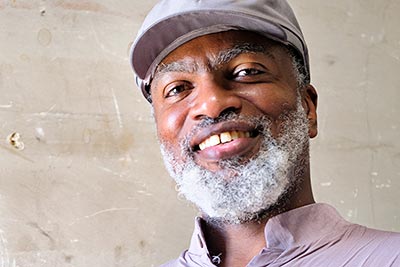
Graham Haynes (b.1960) is a cornetist and composer born in Brooklyn, New York, and raised in Queens, New York. The son of drummer Roy Haynes, the younger Haynes grew up around jazz musicians as his family´s Hollis, Queens, neighborhood was also home to Roy Eldridge, Milt Jackson and Jaki Byard, among many others. He is known as an experimental musician and composer looking for new directions in nu jazz, fusing jazz with elements of hip-hop and electronic music.
Haynes´ two years at Queens College (1978-80) studying composition, harmony and music theory spurred his interest in classical and electronic music (Robert Moog was professor of electronic music there at the time). Haynes also studied trumpet and jazz harmony privately with Dizzy Gillespie alumnus Dave Burns while playing in the Pentecostal Church.
With aspirations to push jazz beyond its traditional boundaries, Graham Haynes´ first foray into electronic music came in 1979 upon meeting alto saxophonist Steve Coleman. Together, they formed a band called Five Elements, which launched an influential group of improvisers called M-Base Collective in the 1980s. Haynes also played with Coleman on what was to be the debut recording for the both of them (Motherland Pulse, with Coleman, Haynes, pianist Geri Allen, bassist Lonnie Plaxico and drummer Marvin "Smitty" Smith or Mark Johnson as well as vocalist Cassandra Wilson on one track, in 1985).
Motherland Pulse was followed by On The Edge Of Tomorrow, with Coleman, Haynes, Allen, Smith, Johnson and Wilson as well as guitarist Kelvyn Bell and electric bassist Kevin Bruce Harris, in 1986; World Expansion (By The M-Base Neophyte), with Coleman, Haynes Allen, Bell, Harris and Wilson as well as vocalist D.K. Dyson, in 1986; Sine Die, with Coleman, Haynes, Allen, Harris, Plaxico, Smith and Wilson as well as trombonist Robin Eubanks, saxophonists Greg Osby, Gary Thomas, Branford Marsalis and Jimmy Cozier, keyboardist James Weidman, guitarist David Gilmore et.al., in 1988; and a live track on Bratislava Jazz Days ´88, with Coleman, Haynes, Weidman, Gilmore and Harris as well as drummer Larry Banks. Haynes and Coleman were also featured on recordings by the M-Base Collective (Flashback On M-Base, recorded in1985-89 but released in 1994, and Anatomy Of A Groove in 1991-92) and by pianist Errol Parker (Live At The Wollman Auditorium, with Haynes, Coleman and other members of the Five Elements, in 1985). During this period, Haynes also recorded with Cassandra Wilson (Days Aweigh in 1987 and Jumpworld in 1989; also, New Moon Daughter in 1995), pianist Rod Williams (Hanging In The Balance in 1989) and Lonnie Plaxico (Plaxico in 1989).
Haynes started his own ensemble, Graham Haynes And No Image, in the late 1980s and recorded his first album as a leader (What Time It Be!, with saxophonist Lance Bryant, keyboardist Mferghu, guitarist Andy Bassford, David Gilmore, Kevin Bruce Harris, drummer Gregory Latty and percussionist Marque Gilmore) in 1990. In the late 1980s, he studied African, Arabic and South Asian music extensively and spent the better part of the early 1990s in Paris. After his move to France in 1990, Haynes incorporated these influences into his next two releases (Nocturne Parisian, with saxophonist Steve Williamson, Mferghu and a group of percussionists, in 1991 and The Griots Footsteps, with Williamson and a large ensemble, in 1994).
Haynes returned to New York City in 1993 to take advantage of the flourishing hip-hop scene, and the resulting album was the sample-heavy Transition (with Williamson, guitarists Jen-Paul Bourelly, Vernon Reid and Brandon Ross, Lonnie Plaxico, drummer Fred Alias, percussionists Jorge Amorin and Daniel Moreno as well as Marc Lindhal, Vera Mantero and Jason "DJ Logic" Kibler on samples and turntables) in 1994. This was followed by the release of Tones For The 21st Century (with harpist Steve Neil and Aaron "DJ Spazecrafte" Lazansky and Tracie Morris on voice and electronics) in 1996.
In the 1990s, Haynes also discovered drum ‘n´ bass and began working with some of the genre´s finest DJs and producers in London and the United States. This manifested in the recording of BPM, a fusion of drum ‘n´ bass beats with the classical music of Richard Wagner, with Brandon Ross, Marque Gilmore, Daniel Moreno and DJ Spazecrafte, in 1999. Haynes also recorded Organik Mechanix with DJ Spazecrafte and synthesizer player Acustyk that same year. Haynes´ most recent recording as a leader is Full Circle, with keyboard players Leon Gruenbaum, James Hurt and Adam Kipple, guitarist Chris Buono, bassist Shadzad Ismaily, and drummers Guy Licata and Marcus Gilmore, in 2007.
Over the years, Haynes has collaborated with a broad range of jazz musicians, including saxophonist David Murray (David Murray Big Band Conducted By Lawrence "Butch" Morris in 1991 and South Of The Border in 1992), clarinetist Don Byron (Music For Six Musicians in 1995), trumpeter Bill Dixon (17 Musicians In Search Of A Sound: Darfur in 2007, Tapestries For Small Orchestra in 2008 and Envoi in 2010), trombonist Craig Harris (Souls Within The Veil in 2003), tuba player Bob Stewart (Then & Now in 1995-96), pianists Jaki Byard (Jaki Byard And The Apollo Stompers: Phantasies II in 1988), Uri Caine (Sphere Music in 1992), Rodney Kendrick (The Secrets Of Rodney Kendrick and Dance, World, Dance in 1993 and Last Chance For Common Sense in 1995), Bheki Mseleku (Beauty Of Sunrise in 1995) and Yoko Fujiyama (Night Wave in 2017), bassist Eric Mingus (Too Many Bullets…Not Enough Soul in 2001), drummers Roy Haynes (The Island in 1990 and Praise in 1998), Bobby Previte (Weather Clear, Track Fast in 1991), Ed Blackwell (The Ed Blackwell Project: What Is Be Like? and What It Is? in 1992) and Ralph Peterson (Art in 1992) as well as vocalist Abbey Lincoln (Who Used To Dance? in 1996). Outside of jazz, Haynes has worked with the likes of The Roots (Do You Want More?!!!??! in 1995 and Illadelph Halflife in 1996), guitarist Vernon Reid (Mistaken Identity in 1996), DJ Logic (Project Logic in 1999 and The Anomaly in 2001) as well as composer, bassist and vocalist Meshell Ndegeocello (The World Has Made Me The Man Of My Dreams in 2007), among many others.
Haynes has frequently collaborated with bassist and producer Bill Laswell on his many projects (Radioaxiom: A Dub Transmission in 1991, Arcana: Arc Of The Testimony in 1996, Sacred System: Nagual Site in 1998, Nicky Skopelitis: Ekstasis Live in 1998, Charged: Charged Live in 1999-2001, Ejigayehu "Gigi" Shibabaw: Gigi in 2001, Points Of Order in 2001 and With A Heartbeat (featuring saxophonist Pharoah Sanders) in 2002, Method Of Defiance: Inamorata in 2007 and the Master Musicians of Jajouka With Material: Apocalypse Live in 2015). He has also been a frequent participant in percussionist Adam Rudolph´s large ensembles (Adam Rudolph´s Moving Pictures: Dream Garden in 2006, Both/And in 2010 and Glare Of The Tiger in 2016 and Adam Rudolph´s Go: Organic Orchestra: Can You Imagine… The Sound Of A Dream in 2007, Sonic Mandala in 2012 and Ragmala in 2018).
Haynes has released eight albums in a collaborative project with sound artist Hardedge (Austere Geometry in 2005, Reality Eclipsed in 2006, Paralyzed By The Approach Of The Inevitable in 2007, But You Can´t, Can You? and Is It That Dark? in 2008, Burned To The Water´s Edge in 2009 as well as Within An Inch Of Its Life and Led Into Uncertainty in 2010).
Since 2013, Haynes has been a member of the Vijay Iyer Sextet and was featured on its debut recording in 2017 (Far From Over, also saxophonists Steve Lehman and Mark Shim, bassist Stephan Crump and drummer Tyshawn Sorey) and, in 2015, he joined the OGJB Quartet (Bamako, TUM CD 050, in 2016). He was also featured in the initial performance and the recording of Wadada Leo Smith´s extended composition Rosa Parks: Pure Love. An Oratorio Of Seven Songs (TUM CD 057) in 2016. In 2017, Haynes participated with drummer Jamire Williams in the trio performance and recording in a de-commissioned church in Harlem of pianist Jason Moran´s Mass (Howl, Eon) created for artist Julie Mehretu´s two site-specific paintings for San Francisco Museum of Modern Art (SFMOMA). In 2018, Haynes participated in the recording of Muhal Richard Abrams´ extended composition Soundpath by the The Warriors Of The Wonderful Sound.
Haynes performed over a period of several years with the late American cornetist, composer and conductor Lawrence D. "Butch" Morris (1947-2013), originator of the Conduction method, and has begun working with ensembles utilizing Conduction, including the Nublu Orchestra, Banff Student Orchestra and Haynes Flute Ensemble.
In 2017, Haynes had two of his classical chamber works, String Quartet No.1 and Prelude and Fugue for 5 Flutes, performed as part of the Interpretations Series at Roulette in Brooklyn, New York City, and is currently working on new chamber music works.
Over the years, Haynes has been involved in several critically acclaimed multimedia projects and has composed the score for the films Flag Wars in 2003 and The Promise in 2014. He has toured annually in Europe, Asia, Brazil and Africa and has been in high demand as a musical director and composer for film, theatre, dance and multimedia projects. He has lectured on music at New York University, the New School of Jazz and Contemporary Music and Columbia University in New York City as well as several universities and creative centers outside of the United States. Haynes has received two nominations for the prestigious Herb Alpert Award In The Arts.
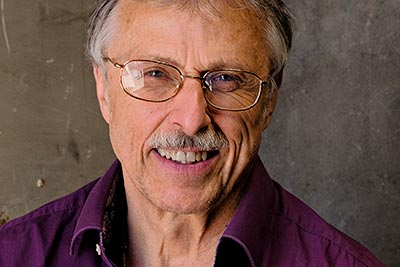
Joe Fonda (b.1954) was born in Amsterdam, upstate New York, and played guitar and bass guitar in his youth. At Berklee College of Music in Boston, Massachusetts (1973-75), he studied composition and arranging while also focusing on the double bass as his main instrument.
After Berklee, Fonda settled in the New Haven, Connecticut area. An important influence during this period was composer and trumpeter Wadada Leo Smith, with whom Fonda played in various groups from 1978 until moving to New York City in 1985. Fonda participated in two important recordings under Smith´s leadership, The Sky Cries The Blues by the Creative Improvisors Orchestra in 1981 and Procession Of The Great Ancestry by a small group including saxophonist John Powell, vibraphonist Bobby Naughton, guitarist Louis Myers, bassist Mchaka Uba and percussionist Kahil El´Zabar in 1983. During this period, Fonda also recorded his first album as a leader (Looking For The Lake, with saxophonists Cliff White and Tim Moran and drummer Claire Arenius, in 1980) and an album with Bobby Naughton (Zoar, with Naughton, Fonda and percussionist Randy Kaye, in 1983).
In addition to music, Fonda has had a long-standing involvement in dance projects and cross-cultural performances. From 1982 to 1986, Fonda was the bassist and dancer with the Sonomama Dance Company. He was also the bassist of the American Tap Dance Orchestra in New York City, directed by world-renowned tap dancer Brenda Bufalino. An independent producer since 1978, Fonda is the founding director of Kaleidoscope Arts, an interdisciplinary performance ensemble.
Soon after moving to New York City, Fonda participated in the collaborative group Mosaic Sextet (with trumpeter Dave Douglas, violinist Mark Feldman, bassoonist Michael Rabinowitz, pianist Michael Jefry Stevens and drummer Harvey Sorgen) that both increased his prominence on the New York scene and served as a basis for some key relationships that still continue today. The group´s album, Today, This Moment, from three sessions in 1988-90 (reissued as part of a two-CD collection Mosaic Sextet) continues to be considered one of the major releases of its time.
In 1992, Fonda and Michael Jefry Stevens co-founded the Fonda/Stevens Group (also Herb Robertson and Harvey Sorgen) that became the longest lasting and, perhaps, the hardest working of all the collaborative groups in which Fonda has participated. The group has toured extensively performing at major international jazz festivals and has released more than ten recordings (The Wish in 1993, Parallel Lines in 1995, Evolution in 1997, Live From Brugge in 1997, Live At The Bunker in 1999, The Healing in 2000, Twelve Improvisations in 2002, Live At Alte Paketpost in 2003, Forever Real in 2004, Trio in 2006, Memphis in 2008, Trio+2: Live In Katowice in 2009 and Live In Spielboden in 2012).
Between 1993 and 2003, Fonda became particularly well known for his collaboration with Anthony Braxton and was Braxton´s bassist of choice during that period. Among other projects, he was a member of the Anthony Braxton Quartet, Sextet, Octet, Ninetet and Tentet. Fonda´s recordings with Braxton range from a duo collaboration (10 Compositions (Duet) 1995) to his participation in large orchestral works (Composition No. 173 in 1994 and Composition No. 162 in 1996). His tenure with Braxton resulted in a total of more than 20 recordings starting with Anthony Braxton´s Charlie Parker Project(with saxophonist Ari Brown, trumpeter Paul Smoker, pianist Misha Mengelberg and drummers Han Bennink and Pheeroan akLaff) and Piano Quartet (with saxophonist Marty Ehrlich, Pheeroan akLaff and Braxton himself on the piano). In addition to those and various other small group projects, he performed with the 38-piece Tri-Centric Orchestra under the direction of Braxton, and was the bassist for the premiere performance in 1996 of Braxton´s opera, Trillium R: Shala Fears for the Poor - Composition No. 162.
In 1996, Braxton appeared on Fonda´s From The Source recording (with trumpeter Herb Robertson, Brenda Bufalino, vocalist Vickie Dodd and percussionist Grisha Alexiev) that served as a blueprint for the group From The Source, which Fonda continued to lead. Fonda´s projects as a leader or co-leader have also included the Joe Fonda Quartet (with Michael Rabinowitz, saxophonist Jeff Lederer and Harvey Sorgen), the Joe Fonda Quintet (with trumpeter Taylor Ho Bynum, bass clarinetist Gebhard Ullmann, soprano saxophonist Chris Jonas and drummer Kevin Norton; Full Circle Suite in 1999), Joe Fonda´s Bottoms Out (with tubist Joe Daley, saxophonists Claire Daly and Gebhard Ullmann, Michael Rabinowitz and drummer Gerry Hemingway; Loaded Basses in 2005 and Live At The Gulbenkian Jazz em Agosto Festival in 2007) and the Step In Trio founded with pianist Carlo Morena (Fonda and Morena with either Michelle Salgarllo, Jeff Hirsfield, George Schuller or Felix Lecaros Herrera on drums; Old Bottle New Wine in 1993, What We´re Hearing in 1994, Step-In in 2000, A Drop of Water (with vocalist Ilse Pfeifer) in 2007, As You Never Said Before in 2010 and Voila La Tendresse in 2019).
Fonda has also recorded a solo bass album (When It´s Time in 1999) and performed as a duo with Chinese guzheng player Xu Fengxia (Distance in 1999; with saxophonist Andre Goudbeek added, Separate Realities in 2003; and, with violinist Jason Kao Hwang added, The House of Treasures in 2008), guitarist Gilbert Isbin (Blister in 2001), viola player Judith Insell (Dark Wood Explorations in 2008) as well as pianists Joan Wildman (Conversations in 2015) and Satoko Fujii (Duet in 2015; Mizu in 2017; Triad, with saxophonist Gianni Mimmo, in 2017; and Four, with trumpeter Natsuki Tamura, in 2019).
Fonda´s numerous collaborative groups have included The NU Band (with saxophonist Mark Whitecage, trumpeter Roy Campbell and drummer Lou Grassi; Live At The Bop Shop in 2001, Live in 2003, The Dope And The Ghost in 2005, Live In Paris in 2007, The Lower East Side Blues in 2008, Relentlessness: Live At The Sunset in 2011 and The Final Concert in 2012 and, with trumpeter Thomas Heberer replacing Campbell, The Cosmological Constant in 2014 and Live In Geneva in 2016) and Conference Call (with Gebhard Ullman, Michael Jefry Stevens and George Schuller; Final Answer in 2000, Variations On A Master Plan 2001, Spirals and Live At The Outpost in 2003, Poetry In Motion in 2006, What About…? in 2007, Seven in 2008 and Prism in 2016). Other collective groups have included a quartet with saxophonists Joe McPhee and Cliff White and drummer Ben Karetnick (Heat Suite in 2002) and a trio with pianist Bruno Angelini and drummer Ramon Lopez (Silent Cascade in 2005 and The New York Session in 2007).
In the new millennium, Fonda´s relationship with Barry Altschul has been one of the central features of his career. The two formed a collaborative group, the FAB Trio, with violinist Billy Bang almost two decades ago and both toured and recorded actively with that trio (Transforming The Space in 2003; Live At The Iron Works in 2004; History Of Jazz In Reverse, TUM CD 028, in 2005; Live In Amsterdam in 2008; and Live At the Sunset in 2008). Following Billy Bang´s passing in 2011, Fonda and Altschul have continued their collaborations in Barry Altschul´s 3dom Factor, a trio they founded with saxophonist Jon Irabagon (The 3dom Factor, TUM CD 032, in 2012; Tales Of The Unforeseen, TUM CD 044, in 2014; Live in Krakow in 2016 and Long Tall Sunshine in 2019), and the OGJB Quartet (Bamako, TUM CD 050, in 2016).
Fonda has also performed and recorded with trumpeter Thomas Heberer (Remedy in 2020), saxophonists Mark Whitecage (Mark Whitecage And Liquid Time in 1990 and Consensual Tension in 1997) and David Bindman (Imaginings in 1997), clarinetists Christopher Rocher (New Origin in 2018) and Guillermo Gregorio (Intersecting Lives in 2018), flutist Jasmine Joy (Trio Joy in 2017), pianist Uwe Oberg (Relight in 2019), guitarists Tony Purrone (Up From The Sky in 1986), Jimmy Williams (When The Lost Becomes Found in 2001) and Michael Musillami (Beijing in 2002, Dachau in 2005, The Treatment in 2007, From Seeds and Old Tea in 2009, Mettle in 2011, Bhut Jolokia 2012, Zephyr in 2015 and Life Anthem in 2017), drummer Tiziano Tonini (Trouble No More … All Men Are Brothers in 2016), percussionist Kevin Norton (Nots in 1997 and For Guy Debord (In Nine Events) in 1998), vocalists Tyrone Henderson (Strawman Dance in 1994, No Comment in 1996 and Not So Unusual Blues in 1997), Katie Bull (Conversations With The Jokers in 2001, Love Spook in 2004, Cup Of Joe, No Bull in 2004, The Story, So Far in 2006, Freak Miracle in 2009 and All Hot Bodies Radiate in 2015), Nicole Metzger (…At Any Other Time in 2001 and That´s What I Want To Do in 2012) and Vesna Pisarovic (Petit Standard in 2018) as well as tap dancer Brenda Bufalino (Dancing My Dance in 2003).
In the past four decades, Fonda has also performed and/or recorded with such other world renowned artists as trumpeter Bill Dixon, trombonists Curtis Fuller and Slide Hampton, saxophonists Bill Barron, Marion Brown, Lou Donaldson, Ken McIntyre and Archie Shepp, clarinetist Perry Robinson, pianists Kenny Barron, Carla Bley and Randy Weston, vibraphonist Teddy Charles and drummer Chico Hamilton, among many others.
Fonda´s most recent projects include the Eastern Boundary Quartet (with saxophonist Mihaly Borbely and drummer Balazs Bagyi from Hungary as well as Michael Jefry Stevens; Eastern Boundary Quartet in 2007, Icicles in 2009, Live At De Werf in 2012 and Live At Jazzforum Bayreuth in 2017), Trio Generations (with Michael Jefry Stevens and drummer Emil Gross; Side Effects in 2012), the Generations Quartet (with Oliver Lake added; Flow in 2016), Dreamstruck with pianist Marilyn Crispell and Harvey Sorgen (Dreamstruck in 2018), the Fonda/Björkenheim/Cleaver Trio (with guitarist Raoul Björkenheim and drummer Gerald Cleaver) and The J. & F. Band (with Jaimoe et.al., From The Roots To The Sky in 2018).
As a sideman, Fonda continues to work with the Karl Berger Trio (Gently Unfamiliar in 2013), the Nicole Metzger New York Connection (…at any other time in 2001 and That´s What I Want To Do in 2010), the Mike Musillami Trio (Old Tea in 2012, Mettle in 2011 and The Anthem in 2017), Barry Altschul´s 3dom Factor, the Mike Kindred Blues Trio and Tiziano Tonini´s Brooklyn Express (No Time Left in 2015), among many others.
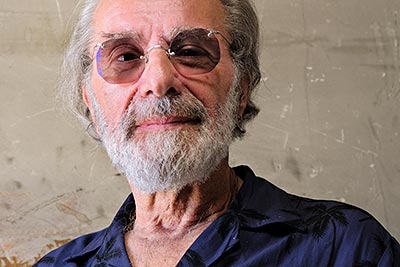
Barry Altschul (b.1943) grew up in the South Bronx in New York City. He began playing the drums at the age of 11 after having earlier played the piano and the clarinet.
As a teenager, Altschul was a member of a doo-wop group, first called the Students and then the Diplomats, that had a minor East Coast hit and toured opposite some of the top acts of the time, including Little Anthony and Frankie Lymon, even performing on some popular TV dance shows of the time, such as the Dick Clark Show. However, under pressure to commit to a long-term contract, Altschul chose to focus on the drums instead.
In the late 1950s and the early 1960s, Altschul was involved in the local hard bop scene playing in jam sessions in the Bronx and in other New York City boroughs with his contemporaries, including saxophonists Dave Liebman and Frank Mitchell, pianists George Cables and Jimmy Hunter and many others. He studied drums with Charli Persip and Sam Ulano and composition with Lee Konitz.
One of Altschul´s first public performances as a drummer was with pianist Larry Willis and bassist Walter Booker in a neighborhood lounge. However, his first "proper" gig was with the Paul Bley Trio (with bassist David Izenson) in what was the inauguration of Slugs´, the (in)famous East Village bar, as a jazz club in 1964. This one-off gig resulted in Altschul working regularly with pianist Paul Bley for the remainder of the 1960s and sporadically also during the next three decades. Other than for his participation in the first recording of the Jazz Composer´s Orchestra (Communication) in April 1965, Altschul´s earliest recordings were also with Bley. These included Touching (with bassist Kent Carter) and Closer (with bassist Steve Swallow) in 1965, Ramblin´, Blood and In Haarlem (all with bassist Mark Levinson) in 1966, Ballads (with bassist Mark Levinson) and Virtuosi (with bassist Gary Peacock) in 1967 as well as a number of others that followed since.
Altschul´s work with Paul Bley drew the attention of others active on New York´s free jazz scene of the 1960s and resulted in tours and/or recording sessions with such notables as saxophonist Steve Lacy, trombonist Roswell Rudd and bassists Gary Peacock, Alan Silva and Steve Swallow. His familiarity with the tradition also led to performances with the likes of saxophonists Sonny Criss, Johnny Griffin, Lee Konitz, Art Pepper and Tony Scott, pianist Hampton Hawes and vocalist Babs Gonzalez, among many others.
At the very end of the 1960s and beginning of the 1970s, Altschul was a member of pianist Chick Corea´s trio with bassist Dave Holland and then participated in the important cooperative group Circle after saxophonist Anthony Braxton joined Corea, Holland and Altschul. He also soon joined saxophonist/flutist Sam Rivers, with whom he had already performed in New York City during the October Revolution in Jazz in 1964, in a new trio that also included Dave Holland and joined the Anthony Braxton Quartet (with trumpeter Kenny Wheeler or trombonist George Lewis and Holland). These three groundbreaking groups solidified his reputation as one of the most creative drummers on the contemporary scene.
Altschul participated in some of the most important modern jazz recordings of the 1970s, including The Song Of Singing (1970) and A.R.C. (1971) by Corea, Holland and Altschul; Circulus (1970), Circling In (1970) and Paris Concert (1971) by Circle; Conference Of The Birds (1972) by the Dave Holland Quartet (with Holland, Braxton and Rivers); Hues (1973), The Quest (1976) and Paragon (1977) by the Sam Rivers Trio; Sizzle (1975) by the Sam Rivers Quintet; Complete Braxton (1971), Five Pieces 1975 and The Montreux/Berlin Concerts (1975) by the Anthony Braxton Quartet; Creative Orchestra Music 1976 by Braxton´s large ensemble; Scorpio (1972) and Japan Suite (1976) by the Paul Bley Trio; Drum Ode (1974) by Dave Liebman; Flexible Flyer (1975) by Roswell Rudd; Coon Bid´ness (1975) by saxophonist Julius Hemphill and Spiral (1975) by pianist Andrew Hill.
In addition, Altschul led his own freebop groups, with such luminaries as pianists Muhal Richard Abrams and Anthony Davis, trombonists Ray Anderson and George Lewis as well as bassist Mark Helias, to name a few. Altschul also began recording as a leader, with his first two recordings for Muse Records, You Can´t Name Your Own Tune (with Rivers, Lewis, Abrams and Holland) from 1977 and Another Time/Another Place (with saxophonist Arthur Blythe, Ray Anderson, Anthony Davis, cellist Abdul Wadud and bassist Brian Smith) from 1978, being among the key modern jazz recordings of the late 1970s. These were followed by Somewhere Else in 1979 and Brahma in 1980 by the Barry Altschul Trio (with Ray Anderson and Mark Helias), For Stu (with Ray Anderson, Anthony Davis and bassist Rick Rozie) in 1979, Irina (with trumpeter Enrico Rava, saxophonist John Surman and Mark Helias) in 1983 and That´s Nice (with saxophonist Sean Bergin, trombonist Glenn Ferris, pianist Mike Melillo and bassist Andy McKee) in 1985.
During a 10-year sojourn in Paris, France, in the late 1980s and early 1990s, Altschul was chosen to be the first foreign Artistic Director of Orchestre Regional De Jazz De Lorraine, a 20-piece French regional big band based in Nancy that, during this time, performed music written by Altschul and arranged by Coleridge-Taylor Perkinson. Altschul also toured Africa, the Middle East and Eastern Europe as a cultural ambassador for the USIS and recorded for a number of European record labels, including sessions led by saxophonists Claudio Fasoli, André Jaume and Dave Liebman, pianists Paul Bley, Kenny Drew, Franco D´Andrea, Denis Levaillant and Simon Nabotov, bassists John Lindberg and Niels-Henning Ørsted-Pedersen and vocalist Tiziana Ghiglioni. Overall, Altschul has participated in over 160 recording during his career.
After returning to the United States in 1993, Altschul took a teaching position at Sarah Lawrence College for a period of ten years and, although he soon began to perform in a few clubs where he also curated the music program, was largely invisible to the broader jazz audience. In 2003, bassist Adam Lane invited Altschul to participate in a recording (Fo(u)r Being(s)) that also featured trumpeter Paul Smoker and saxophonist John Tchicai and led to a small tour getting Altschul more interested in live performance again.
Around this time, Altschul also joined forces with Billy Bang and Joe Fonda to form the FAB Trio, a collective group that became his first regular performing vehicle in the United States in two decades. The trio toured worldwide and recorded five highly acclaimed albums (Transforming The Space in 2003; Live At The Iron Works in 2004; History Of Jazz In Reverse, TUM CD 028, in 2005; Live In Amsterdam in 2008; and Live At the Sunset in 2008). After Billy Bang´s passing in 2011, Altschul and Fonda have continued their collaboration in Barry Altschul´s 3dom Factor they founded with saxophonist Jon Irabagon (The 3dom Factor, TUM CD 032, in 2012; Tales Of The Unforeseen, TUM CD 044, in 2014; Live in Krakow in 2016 and Long Tall Sunshine in 2019) and the OGJB Quartet (Bamako, TUM CD 050, in 2016).
Altschul first performed with Jon Irabagon on their 2010 recording with bassist Peter Bendler (Foxy). Since that time, Altschul and Irabagon have also performed together in another trio with Mark Helias (It Takes All Kinds in 2013) in addition to the 3dom Factor.
In the new millennium, Altschul has also been a part of Roswell Rudd´s Trombone Tribe (with trombonists Roswell Rudd, Deborah Weisz and Steve Swell as well as tubist Bob Stewart and bassist Henry Grimes) and The Swell-Ullman 4 (with Steve Swell, saxophonist Gebhard Ullman and bassist Hilliard Greene; Desert Songs And Other Landscapes in 2004 and Live In Montreal in 2008) and has led several groups of his own that have included the likes of Uri Caine, Dave Douglas, Hilliard Greene, Hayes Greenfield, Mark Helias, Roswell Rudd, John Tchicai and many others. In 2007, he reunited with Sam Rivers and Dave Holland for a recorded performance by the Sam Rivers Trio (Reunion: Live In New York).
In 2015, pianist Iro Haarla, bassist Ulf Krokfors and Altschul recorded Around Again - The Music Of Carla Bley (TUM CD 054), a selection of Carla Bley compositions many of which Altschul had already recorded with the Paul Bley Trio five decades earlier.

